New research may help scientists unravel the physics of the solar wind
Tuesday, 18 January 2022 04:54 A new study led by University of Minnesota Twin Cities researchers, using data from NASA's Parker Solar Probe, provides insight into what generates and accelerates the solar wind, a stream of charged particles released from the sun's corona. Understanding how the solar wind works can help scientists predict "space weather," or the response to solar activity-such as solar flares-that can impact b
A new study led by University of Minnesota Twin Cities researchers, using data from NASA's Parker Solar Probe, provides insight into what generates and accelerates the solar wind, a stream of charged particles released from the sun's corona. Understanding how the solar wind works can help scientists predict "space weather," or the response to solar activity-such as solar flares-that can impact b Chinese scientists build 'Artificial Moon' to conduct experiments in low gravity
Tuesday, 18 January 2022 04:54 According to the South China Morning Post, the facility located in Jiangsu Province, will play an important part in the exploration of the Moon as China plans to land its astronauts on Earth's satellite by 2030 and set up a base there.
Chinese scientists have built an artificial moon that will make it possible to conduct experiments in low gravity. According to the researchers, their creat
According to the South China Morning Post, the facility located in Jiangsu Province, will play an important part in the exploration of the Moon as China plans to land its astronauts on Earth's satellite by 2030 and set up a base there.
Chinese scientists have built an artificial moon that will make it possible to conduct experiments in low gravity. According to the researchers, their creat China conducts its first rocket launch of 2022
Tuesday, 18 January 2022 04:54 China launched a Long March 2D carrier rocket on Monday morning, kicking off the country's space program for 2022.
The rocket blasted off at 10:35 am at the Taiyuan Satellite Launch Center in northern China's Shanxi province and soon placed the Shiyan 13 experimental satellite in its preset orbit, China Aerospace Science and Technology Corp said in a statement.
This was China's first
China launched a Long March 2D carrier rocket on Monday morning, kicking off the country's space program for 2022.
The rocket blasted off at 10:35 am at the Taiyuan Satellite Launch Center in northern China's Shanxi province and soon placed the Shiyan 13 experimental satellite in its preset orbit, China Aerospace Science and Technology Corp said in a statement.
This was China's first The International Space Station connected via the SpaceDataHighway
Tuesday, 18 January 2022 04:54 The Airbus' SpaceDataHighway - developed with the support of ESA - provides broadband connectivity services between the International Space Station (ISS) and the Earth. With the Columbus Ka-band (ColKa) terminal now installed and fully tested on-board the ISS, a SpaceDataHighway satellite will start to relay data via a bi-directional link in real time between the ISS Columbus Laboratory and the
The Airbus' SpaceDataHighway - developed with the support of ESA - provides broadband connectivity services between the International Space Station (ISS) and the Earth. With the Columbus Ka-band (ColKa) terminal now installed and fully tested on-board the ISS, a SpaceDataHighway satellite will start to relay data via a bi-directional link in real time between the ISS Columbus Laboratory and the Palomar survey instrument analyzes impact of Starlink satellites
Monday, 17 January 2022 16:57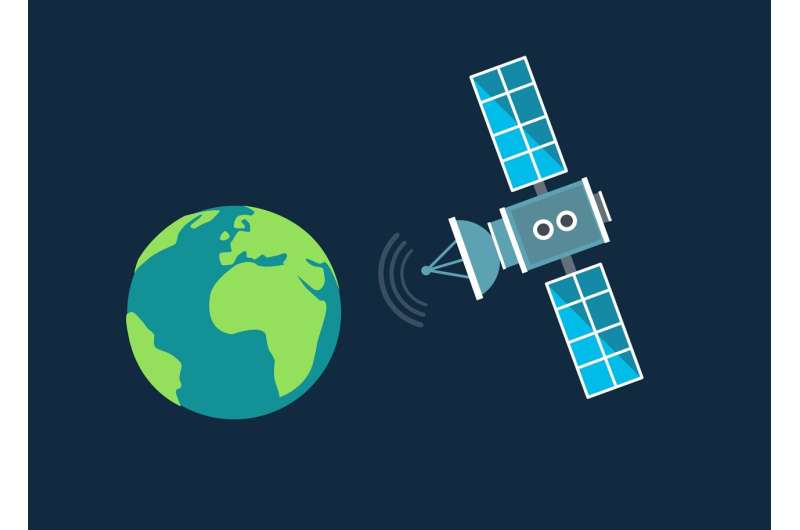
Since 2019, SpaceX has been launching an increasing number of internet satellites into orbit around Earth. The satellite constellation, called Starlink, now includes nearly 1,800 members orbiting at altitudes of about 550 kilometers. Astronomers have expressed concerns that that these objects, which can appear as streaks in telescope images, could hamper their scientific observations.
To quantify these effects, a team of researchers studied archival images captured by the National Science Foundation (NSF)-funded Zwicky Transient Facility (ZTF), an instrument that operates from Caltech's Palomar Observatory near San Diego. ZTF scans the entire night sky every two days, cataloging cosmic objects that explode, blink, or otherwise change over time. This includes everything from supernovae to near-Earth asteroids. The Zwicky team members say they decided to specifically study the effects of Starlink satellites because they currently represent the largest low-Earth orbit, or LEO, constellation, and they have well-characterized orbits.
The findings, reported in the January 17 issue of The Astrophysical Journal Letters, shows 5,301 satellite streaks appear in archival images taken between November 2019 and September 2021. The streaks are most apparent in so-called twilight observations, those taken at dawn or dusk, which are important for finding near-Earth asteroids that appear close to the sun in the sky.
Space Force signals demand for commercial weather data, but will the industry deliver?
Monday, 17 January 2022 14:16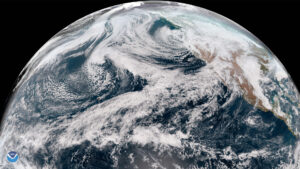
Military needs for weather data such as cloud coverage and theater weather imagery currently cannot be met by the commercial industry and likely will require significant new investment.
Industry offers cautious optimism about state of space investment
Monday, 17 January 2022 14:02
After a year that saw the rise and potential fall of one tool for space companies to raise money, executives and investors have varying degrees of optimism about the state of the industry heading into 2022.
Space Station communications infographic
Monday, 17 January 2022 13:37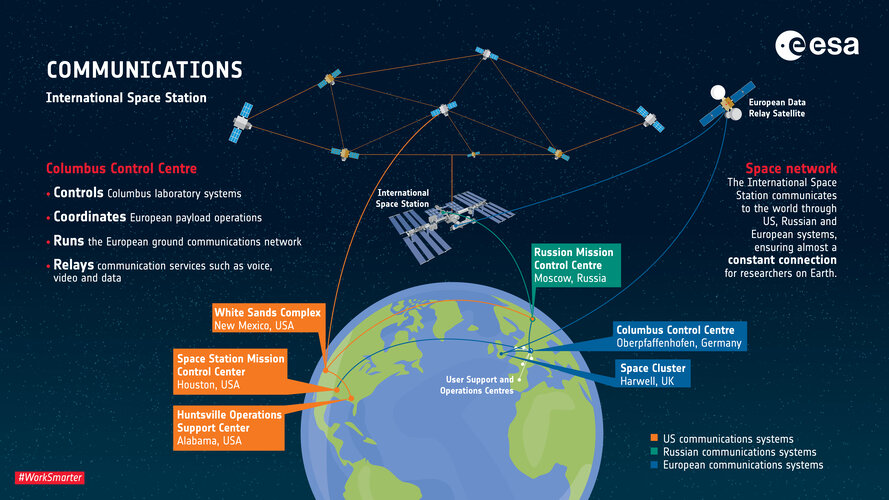 Image:
Space Station communications infographic
Image:
Space Station communications infographic Watch Director General's annual press conference 2022
Monday, 17 January 2022 09:28
Watch live: our start-of-year press conference looking ahead at 2022, with ESA Director General Josef Aschbacher and ESA Directors, from 10:00 CET on 18 January.
China’s first launch of 2022 puts classified Shiyan-13 satellite into orbit
Monday, 17 January 2022 09:03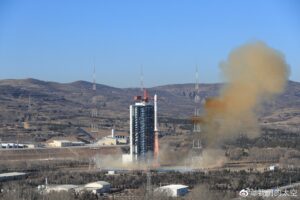
A Long March 2D carried the classified Shiyan-13 test satellite into orbit late Sunday, marking the start of what is planned to be a busy year of launches for China.
Data-relay system connects astronauts direct to Europe
Monday, 17 January 2022 08:41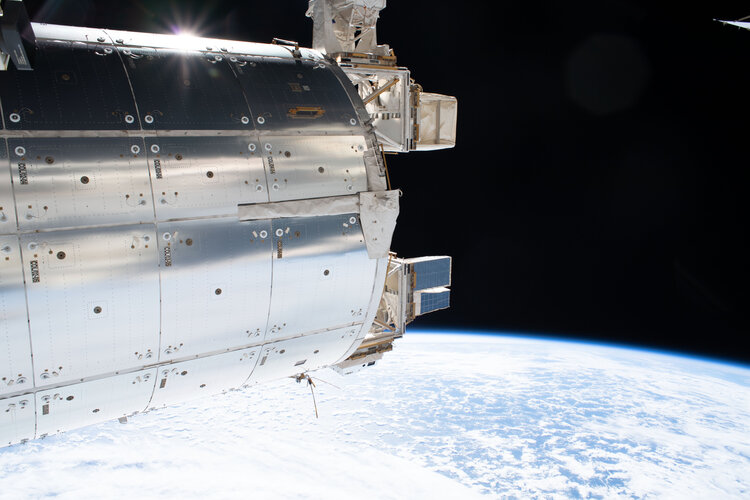
Astronauts on board the International Space Station are connecting straight to Europe at light speed, thanks to the European Data Relay System.
Space science in 360° | Cosmic Kiss
Monday, 17 January 2022 08:00 Video:
00:00:00
Video:
00:00:00
Immerse yourself in 360° of science with ESA astronaut Matthias Maurer as he prepares an experiment to examine how human cells behave in weightlessness.
The Cytoskeleton experiment is a biological study that aims to determine the changing function of RhoGTPases when in vitro cell cultures are exposed to weightlessness. It will run in the Biolab facility of Europe’s Columbus laboratory.
In this video, we see Matthias remove Cytoskeleton cell cultures from the Minus Eighty Lab Freezer ISS (MELFI) and prepare them in the Life Sciences Glovebox (LSG) before installing the experiment in Columbus’s BioLab.
Matthias was launched to the International
Stratolaunch plane flies again as company prepares for hypersonic tests
Monday, 17 January 2022 02:29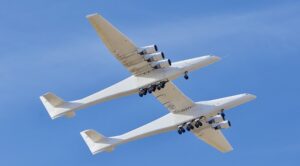
Stratolaunch flew its giant aircraft Jan. 16 for just the third time as company executives promise a higher rate of flight activities this year, including the first flight of a hypersonic test vehicle.
Crown aurora borealis
Sunday, 16 January 2022 17:30 Video:
00:00:55
Video:
00:00:55
Timelapse video made during ESA astronaut Thomas Pesquet’s second mission to the International Space Station, “Alpha” around 4 November 2021. The camera was setup to take pictures at intervals of two a second, and the pictures are then edited into this video that plays at 25 pictures a second. The video is around 12 times faster than real speed.
Thomas shared this video on social media explaining that the pictures were taken from the docked Crew Dragon spacecraft windows and it was the strongest aurora the crew had seen during their six months ins space.
Over 200 experiments were
DESI maps more galaxies than all previous surveys combined
Sunday, 16 January 2022 01:43 The Dark Energy Spectroscopic Instrument (DESI) has cataloged more galaxies than all other previous three-dimensional redshift surveys combined, measuring 7.5 million galaxies in only seven months since beginning science operations. The US Department of Energy's Lawrence Berkeley National Laboratory leads DESI, which is installed at Kitt Peak National Observatory, a program of NSF's NOIRLab, on
The Dark Energy Spectroscopic Instrument (DESI) has cataloged more galaxies than all other previous three-dimensional redshift surveys combined, measuring 7.5 million galaxies in only seven months since beginning science operations. The US Department of Energy's Lawrence Berkeley National Laboratory leads DESI, which is installed at Kitt Peak National Observatory, a program of NSF's NOIRLab, on 
